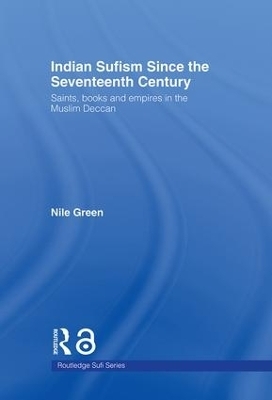
Indian Sufism since the Seventeenth Century
Saints, Books and Empires in the Muslim Deccan
Seiten
2006
Routledge (Verlag)
978-0-415-39040-8 (ISBN)
Routledge (Verlag)
978-0-415-39040-8 (ISBN)
Nile Green reveals the politics and poetry of Indian Sufism through the study of Islamic sainthood in the midst of a cosmopolitan Indian society comprising migrants, soldiers, litterateurs and princes.
Sufism is often regarded as standing mystically aloof from its wider cultural settings. By turning this perspective on its head, Indian Sufism since the Seventeenth Century reveals the politics and poetry of Indian Sufism through the study of Islamic sainthood in the midst of a cosmopolitan Indian society comprising migrants, soldiers, litterateurs and princes.
Placing the mystical traditions of Indian Islam within their cultural contexts, this interesting study focuses on the shrines of four Sufi saints in the neglected Deccan region and their changing roles under the rule of the Mughals, the Nizams of Haydarabad and, after 1948, the Indian nation. In particular Green studies the city of Awrangabad, examining the vibrant intellectual and cultural history of this city as part of the independent state of Haydarabad. He employs a combination of historical texts and anthropological fieldwork, which provide a fresh perspective on developments of devotional Islam in South Asia over the past three centuries, giving a fuller understanding of Sufism and Muslim saints in South Asia.
Sufism is often regarded as standing mystically aloof from its wider cultural settings. By turning this perspective on its head, Indian Sufism since the Seventeenth Century reveals the politics and poetry of Indian Sufism through the study of Islamic sainthood in the midst of a cosmopolitan Indian society comprising migrants, soldiers, litterateurs and princes.
Placing the mystical traditions of Indian Islam within their cultural contexts, this interesting study focuses on the shrines of four Sufi saints in the neglected Deccan region and their changing roles under the rule of the Mughals, the Nizams of Haydarabad and, after 1948, the Indian nation. In particular Green studies the city of Awrangabad, examining the vibrant intellectual and cultural history of this city as part of the independent state of Haydarabad. He employs a combination of historical texts and anthropological fieldwork, which provide a fresh perspective on developments of devotional Islam in South Asia over the past three centuries, giving a fuller understanding of Sufism and Muslim saints in South Asia.
Nile Green is Milburn Fellow at lady Margaret Hall, Oxford and Lecturer in South Asian Studies at Manchester University. His wide-ranging research interests focus on Sufism and the history and ethnography of Islam in South Asia, Iran and Afghanistan. >
1. Muslim Mystics in an Age of Empire: The Sufis of Awrangabad 2. The Poetry and Politics of Sainthood in a Mughal Successor State 3. The Sufis in the Shadow of a New Empire 4. Saints, Rebels and Revivalists 5. The Awrangabad Saints in the New India. Conclusions
| Erscheint lt. Verlag | 15.5.2006 |
|---|---|
| Reihe/Serie | Routledge Sufi Series |
| Zusatzinfo | 2 Line drawings, black and white; 9 Halftones, black and white; 11 Illustrations, black and white |
| Verlagsort | London |
| Sprache | englisch |
| Maße | 156 x 234 mm |
| Gewicht | 540 g |
| Themenwelt | Geisteswissenschaften ► Geschichte ► Regional- / Ländergeschichte |
| Geschichte ► Teilgebiete der Geschichte ► Religionsgeschichte | |
| Geisteswissenschaften ► Religion / Theologie ► Islam | |
| Sozialwissenschaften ► Soziologie ► Spezielle Soziologien | |
| ISBN-10 | 0-415-39040-0 / 0415390400 |
| ISBN-13 | 978-0-415-39040-8 / 9780415390408 |
| Zustand | Neuware |
| Haben Sie eine Frage zum Produkt? |
Mehr entdecken
aus dem Bereich
aus dem Bereich
Von den Anfängen bis zur Gegenwart
Buch | Hardcover (2022)
C.H.Beck (Verlag)
34,00 €
Herkunft, Blüte, Weg nach Osten
Buch | Hardcover (2024)
C.H.Beck (Verlag)
39,00 €
Heilsgeschichte und Weltpolitik
Buch | Hardcover (2024)
Matthes & Seitz (Verlag)
44,00 €


